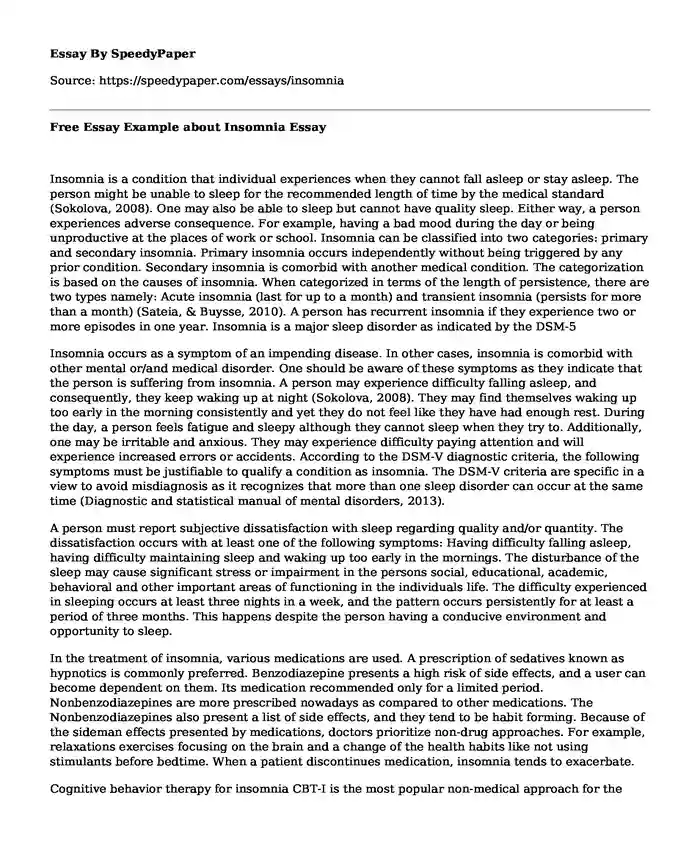
| Type of paper: | Essay |
| Categories: | Health and Social Care |
| Pages: | 4 |
| Wordcount: | 836 words |
Insomnia is a condition that individual experiences when they cannot fall asleep or stay asleep. The person might be unable to sleep for the recommended length of time by the medical standard (Sokolova, 2008). One may also be able to sleep but cannot have quality sleep. Either way, a person experiences adverse consequence. For example, having a bad mood during the day or being unproductive at the places of work or school. Insomnia can be classified into two categories: primary and secondary insomnia. Primary insomnia occurs independently without being triggered by any prior condition. Secondary insomnia is comorbid with another medical condition. The categorization is based on the causes of insomnia. When categorized in terms of the length of persistence, there are two types namely: Acute insomnia (last for up to a month) and transient insomnia (persists for more than a month) (Sateia, & Buysse, 2010). A person has recurrent insomnia if they experience two or more episodes in one year. Insomnia is a major sleep disorder as indicated by the DSM-5
Insomnia occurs as a symptom of an impending disease. In other cases, insomnia is comorbid with other mental or/and medical disorder. One should be aware of these symptoms as they indicate that the person is suffering from insomnia. A person may experience difficulty falling asleep, and consequently, they keep waking up at night (Sokolova, 2008). They may find themselves waking up too early in the morning consistently and yet they do not feel like they have had enough rest. During the day, a person feels fatigue and sleepy although they cannot sleep when they try to. Additionally, one may be irritable and anxious. They may experience difficulty paying attention and will experience increased errors or accidents. According to the DSM-V diagnostic criteria, the following symptoms must be justifiable to qualify a condition as insomnia. The DSM-V criteria are specific in a view to avoid misdiagnosis as it recognizes that more than one sleep disorder can occur at the same time (Diagnostic and statistical manual of mental disorders, 2013).
A person must report subjective dissatisfaction with sleep regarding quality and/or quantity. The dissatisfaction occurs with at least one of the following symptoms: Having difficulty falling asleep, having difficulty maintaining sleep and waking up too early in the mornings. The disturbance of the sleep may cause significant stress or impairment in the persons social, educational, academic, behavioral and other important areas of functioning in the individuals life. The difficulty experienced in sleeping occurs at least three nights in a week, and the pattern occurs persistently for at least a period of three months. This happens despite the person having a conducive environment and opportunity to sleep.
In the treatment of insomnia, various medications are used. A prescription of sedatives known as hypnotics is commonly preferred. Benzodiazepine presents a high risk of side effects, and a user can become dependent on them. Its medication recommended only for a limited period. Nonbenzodiazepines are more prescribed nowadays as compared to other medications. The Nonbenzodiazepines also present a list of side effects, and they tend to be habit forming. Because of the sideman effects presented by medications, doctors prioritize non-drug approaches. For example, relaxations exercises focusing on the brain and a change of the health habits like not using stimulants before bedtime. When a patient discontinues medication, insomnia tends to exacerbate.
Cognitive behavior therapy for insomnia CBT-I is the most popular non-medical approach for the treatment of insomnia. CBT-I has been found to be even more efficient in the long term as compared to other medication because it tends to give short term results. When compared to mindfulness-based stress reduction (MBSR), CBT-I reflects more effective results regarding the length of the treatment and the long-term maintenance of the treatment result (Sokolova, 2008). CBT-I applies approaches like the stimulus conditioning to help in learning the association between sleep and the bed. Using sleep restriction, a patient can achieve regulation in their sleeping patterns, and the cognitive restructuring assists them to address the anxiety thoughts which cause a deprivation of sleep. Behavior therapy is beneficial as it addresses the underlying causes of sleep disorder. The advantage of the CBT-I is that, once the results have been achieved there is no need for long-term administration. CBT-I approaches also seek to address insomnia as well as the comorbid medical and /or mental disorder.
Insomnia is a sleep disorder where a person is unable to sleep or maintain sleep without an effort to do so. Insomnia can be categorized as either primary or secondary. It has symptoms that are similar to other sleep disorders. However, the DSM-V gives a clear guideline for diagnosis to insomnia to ensure that a patient is not misdiagnosed with insomnia. The disturbance must cause significant distress to the persons daily operation. The difficulty must persist for at least three times a week.
References
Diagnostic and statistical manual of mental disorders. (2013). Washington, D.C.
Sateia, M., & Buysse, D. (2010). Insomnia. London: Informal Healthcare.
Sokolova, K. (2008). Insomnia. Rockville Centre, NY: Heavy Metal Magazine.
Cite this page
Free Essay Example about Insomnia. (2019, Aug 30). Retrieved from https://speedypaper.net/essays/insomnia
Request Removal
If you are the original author of this essay and no longer wish to have it published on the SpeedyPaper website, please click below to request its removal:
- The Republic's Defense of Socrates and Philosophy, Essay Example
- Personal Essay Example: What Cancer of My Mom Taught Me
- Free Essay Example on ERP History
- Report Planning for Walmart Company, Free Paper Sample for Students
- Criminal Homicide Essay Example
- Free Essay: Texas Should Legalise the Medical and Recreational Use of Marijuana
- Essay Sample on The Foundational Psychopathology Research
Popular categories




